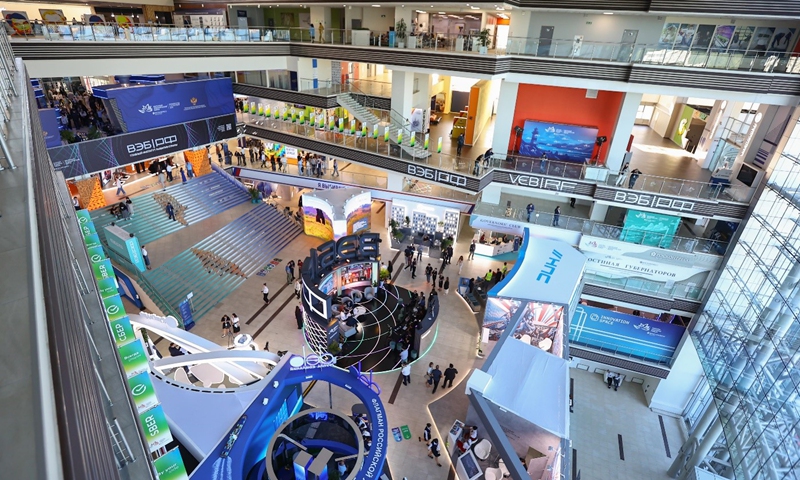
The Eastern Economic Forum (EEF) was held in Vladivostok, Russia from September 3 to 6, 2024. Photo: Courtesy of the Roscongress Foundation
The Eastern Economic Forum (EEF) 2024, organized by the Roscongress Foundation, took place in Vladivostok from September 3 to 6. The event, held on the campus of Far Eastern Federal University (FEFU), gathered CEOs of leading Russian and foreign companies, representatives of government agencies, leading economists, and experts. This year's main theme was "Far East 2030. Combining Strengths to Create New Potential."
"The Forum didn't simply take place; it was a success. This is evidenced by the number of agreements signed, their amount, and most importantly, the number of decisions taken by the president. Almost immediately after the completion of the EEF, a strategic session on the socioeconomic development of the Far East chaired by Prime Minister of the Russian Federation Mikhail Mishustin will be held in Moscow.The proposals that were voiced at the Forum and received the president's support will be studied there. I would like to reemphasize: For us, the EEF is not some big, beautiful event. For us, the Forum is a purely working tool that creates opportunities for further effective work to develop the Far East," said Yury Trutnev, Deputy Prime Minister of the Russian Federation and Plenipotentiary Representative of the President of the Russian Federation in the Far Eastern Federal District.
This year, the EEF reaffirmed its status as an authoritative platform for discussions on political and economic processes in Asia by consolidating the positive momentum of Russia strengthening its trade positions in the Asia-Pacific region and intensifying multilateral and bilateral relations with the countries of the region.
"Over the past nine years, the Eastern Economic Forum has turned into a powerful institution for national development. The program included more than 120 sessions and roundtables that were attended by over 700 speakers. More than 300 agreements worth a total of RUBLE 5.5 trillion were signed at the venue. In the current realities, in addition to its main goals, the EEF is taking on another, subtler, and equally important, meaning. It has become a platform that demonstrates to everyone worldwide what the results of cooperation between countries look like if such cooperation is based on the principles of equality, mutual consideration of interests, and a sincere desire for joint creation," said Anton Kobyakov, Adviser to the President of the Russian Federation and Executive Secretary of the EEF Organizing Committee.
Business programThe Forum program was divided into seven thematic pillars: "New Contours of International Cooperation," "Technologies to Ensure Independence," "Financial Value System," "The Russian Far East," "People, Education, and Patriotism," "Transport and Logistics: New Routes," "Master Plans: From Architecture to Economy."
The EEF also included meetings among representatives of business circles of Russia and the Asia-Pacific region. Participants in the business dialogues "Russia-ASEAN," "Russia-India," and "Russia-China" discussed ways to strengthen cooperation and the implementation of joint projects and initiatives.
Plenary sessionThe keynote event of the Forum was the plenary session, which was attended by President of the Russian Federation Vladimir Putin, as well as other international dignitaries. In his speech, Putin spoke about ways to further develop the Far East and strengthen cooperation with partner countries, and also provided an assessment of the current state of affairs in the global economy.
"As you know, we have identified the development of the Far East as a national priority for the entire 21st century. The importance and correctness of this decision have been confirmed by life itself, the challenges that we have faced recently, and most importantly, the objective trends that are gaining momentum in the global economy, where the main business ties, trade routes, and the entire development trajectory overall are being increasingly reoriented toward the East and the Global South. Our Far Eastern regions provide direct access to these growing and promising markets, thereby enabling us to overcome the barriers that some Western elites are trying to impose on the entire world. And most importantly, as I have already stated, our Far East region is a huge space for the spearheading of business initiatives, the launch of complex projects, and the establishment of entire new industries," Putin said, according to forumvostok.ru.
ParticipantsThe Forum participants included more than 7,100 people, with over 1,500 media representatives from 75 countries and regions, including Russia. The largest delegations came from China, Malaysia, Bulgaria, Vietnam, and Myanmar.
The Forum was attended by seven heads of federal services and agencies, and 18 heads of the Russian regions.
In addition, the participants included more than 2,500 representatives of Russian and foreign businesses from more than 1,100 companies (including more than 125 foreign companies and roughly 975 Russian companies).




